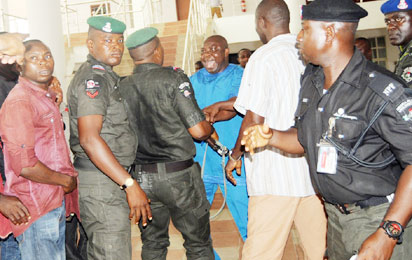A YEAR to the 50th anniversary of the March on Washington and the benediction of Martin Luther King’s “I Have a Dream” speech, America reached for a brush, dipped it in white paint and freshened the racial colour line of which King’s predecessor, W. E. B. Du Bois, spoke so eloquently 60 years earlier in The Souls of Black Folk.
I am speaking of the murder on February 26, 2012 of Trayvon Martin, an unarmed 17-year-old African-American boy by George Zimmerman, a White-Hispanic American.
[caption id="attachment_411397" align="alignleft" width="217"]
 Martin Luther King Jr[/caption]
Martin Luther King Jr[/caption]Martin had crossed the colour line by his sheer presence in Zimmerman’s gated community. Thus, though warned by the police not to follow Martin, Zimmerman would sooner damn the consequences, if any, than let a Black boy “get away” with the “crime.” An all-White jury acquitted Zimmerman.
Martin’s murder echoes the slaughter of the 14-year-old Emmet Till in the aptly named town of Money (after all, what was slavery for which racism was a necessary ideology but the unconscionable pursuit of lucre?) in Mississippi, a state King described in his speech as “sweltering with the heat of injustice . . . [and] oppression.”
Till’s crime was “flirting” with a White woman, Carolyn Bryant, by “speaking” to or “whistling” at her. Days after the encounter, Carolyn’s husband, aided by his brother, seized Till from his great-uncle’s house where he had been staying on a visit from Chicago, drove him to a barn, tortured and then shot him through the head. Bryant and his brother were acquitted of kidnapping and murder.
So has nothing changed in the racial psychology of America since the genocide against Native Americans (the true owners of the land), Lincoln’s Emancipation Proclamation of 1863, the Civil Rights revolution of the 1960s? You would be an incurable cynic, an insufferable paranoiac, to deny the monumental progress since the unthinkable days of lynchings and “For Whites Only.”
But you would be a delusional optimist, a closet racist, to think that America is now in a post-racial epoch. The election and re-election of Barack Hussein Obama, giving him and his all-too-black family occupancy of the White House, is enough to cause such euphoria. Still, the racial cauldron boils over every now and then for the requisite reality check.
And when it does, we are reminded of the great paradox of America’s self-proclamation as the land of freedom, of the constitutional enshrinement of the equal humanity of all, stirring sentiments founded, nevertheless, on the twin evils of genocide and slavery.
Which leads to the inescapable fact of racism as the political unconscious of America. For to perpetuate the national myth of being the land of freedom, America has, necessarily, to deny its history that perpetually mocks the claim. The result, to slightly adapt Du Bois speaking of the Negro (African-American), is “a double consciousness”: the rousing declamation of freedom while committing unspeakable atrocities.
Thus, two ideologically “unreconciled strivings,” two “warring” claims in one body-politic for a classic case of trauma and repression.
As with every trauma, the only way to break its crippling hold on the present and the compulsion to repeat the original catastrophe in new, often unrecognisable, ways is to acknowledge it. But America’s refusal to confront its “collective unconscious,” as Carl Jung might put it, leaves every person of conscience wondering how, in the second decade of the 21st Century, the great miscarriage of justice in the Trayvon Martin case could happen. Or maybe not, since our world as currently constituted remains largely divided by the colour line.
In the “unconscious” depths of the mind of White America — and I speak generally, mindful that about a third of the 250,000 thousand that marched on Washington were White people —the African or coloured person is inherently inferior. Is this a cynical view? Well, then, join Toni Morrison in a thought experiment.
In an interview with the Guardian (UK) of April 13, 2012, Morrison disclosed that she performed the experiment, at the age of 17, in an effort to understand the kind of rage that led some White mothers in the south to try to overturn a school bus carrying Black children. “I didn’t know if I could turn over a bus full of little White kids,” she said. “I didn’t know if I could feel that… fury.
And I tried very hard to. This is what I did: I said suppose … horses began to speak. And began to demand their rights. Now, I’ve ridden horses. They’re very good workers. They’re very good racehorses. Suppose they just … want more. Suppose they want to go to school! Suppose they want to sit next to me in the theatre. I began to feel this sense of — ‘I like you, but …’ ‘You’re good, but …’ Suppose they want to sleep with my children?!”
As her interviewer thankfully informs us, Morrison was by this point “laughing heartily.” Then the clincher: “I had to go outside the species! But it worked, I could feel it. You know; don’t sit next to me.” This is the psychic state that keeps the colour line continuously whitewashed and bright in America. But it can be erased. America’s tantalising promise of one human identity, which affirms the dream of a common human destiny, demands nothing less. But will the greatest power on earth even try?

